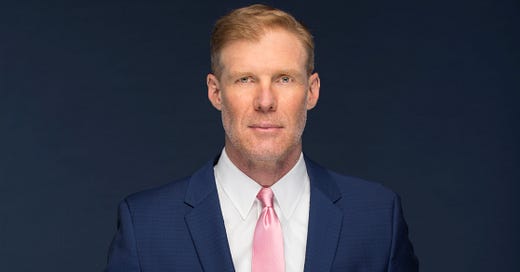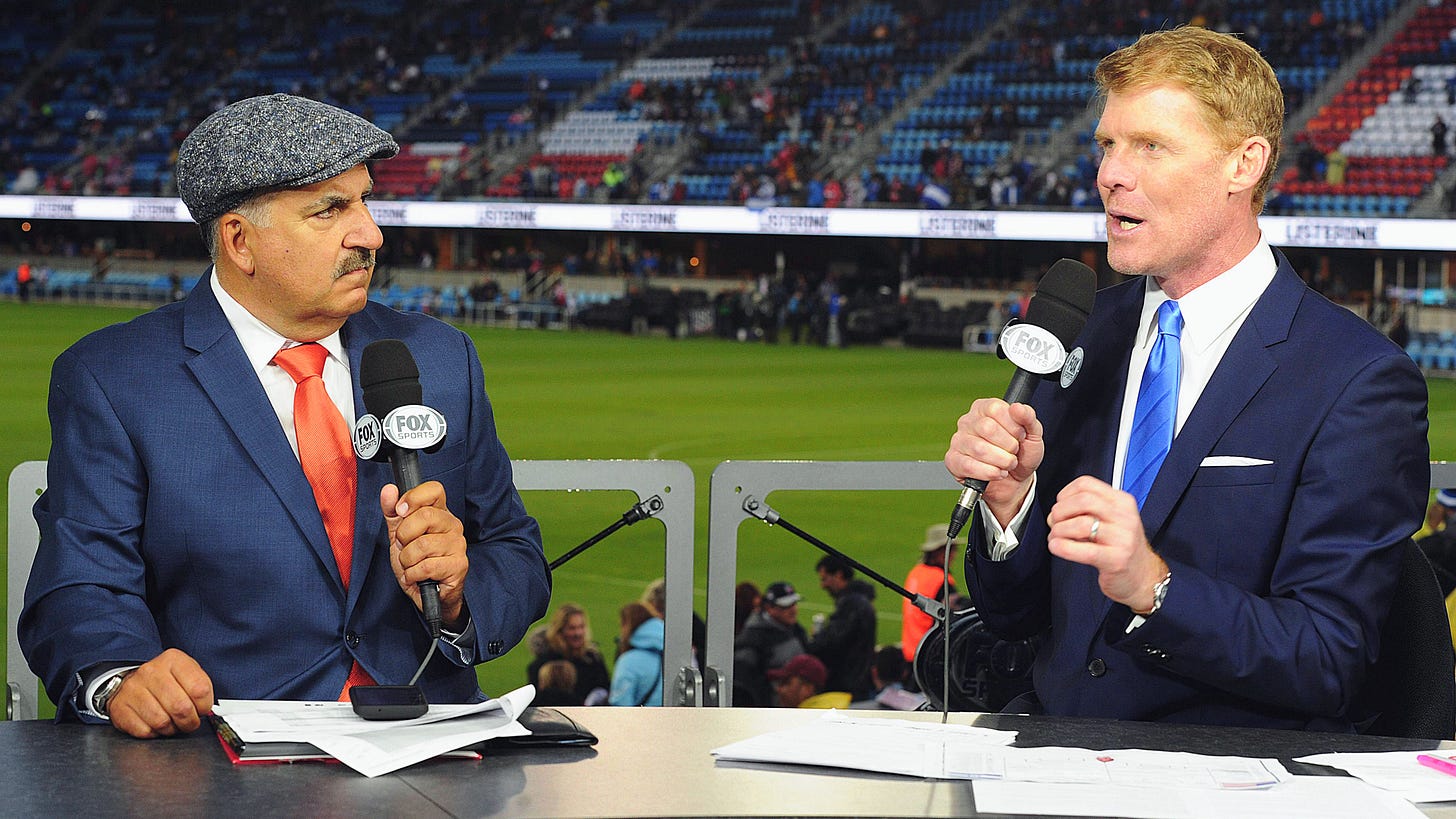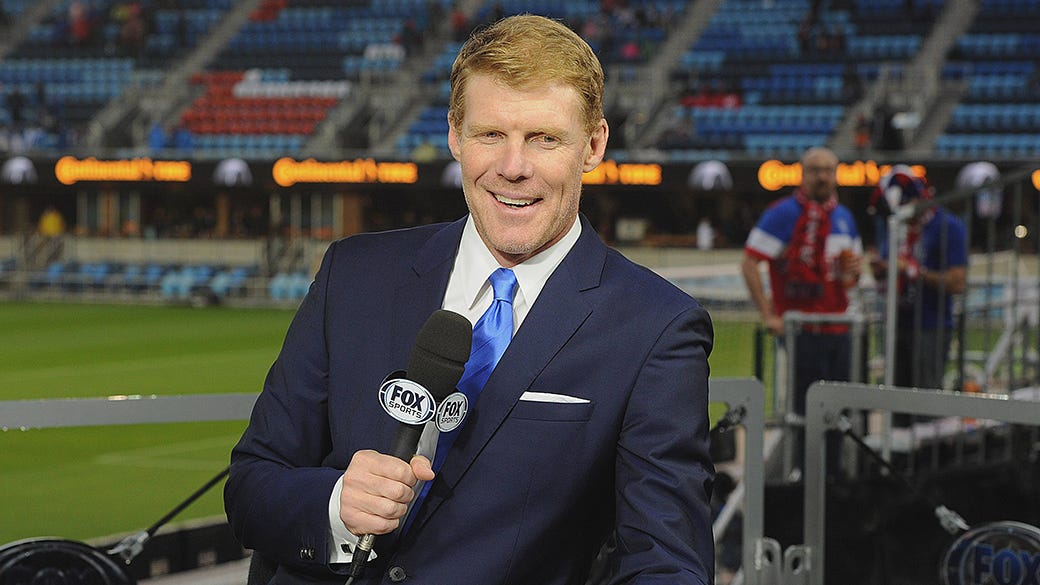Alexi Lalas is Here for Your Hate
The broadcaster is one of the most controversial men in American soccer. He also knows exactly what he's doing.
If you met Alexi Lalas, away from the cameras and away from his Twitter account, I bet you would like him. He’s funny and mellow and generous. He isn’t the loud, quarrelsome man you see on TV. His long-time colleague, presenter and friend Rob Stone even calls him “more of an introvert.”
Lalas tends to hang out with fans in local bars the night before U.S. national team games, patiently taking pictures with them. Even though we don’t know each other particularly well, he once changed his coast-to-coast travel plans—opting to take a redeye flight and drive a few hours out of his way—just to come and talk to my college students. He wouldn’t accept payment or reimbursement of his expenses for the event. That’s just to get my own bias out of the way right at the top.
If you’re a regular soccer viewer but haven’t met Lalas, you likely have an opinion on him and his work regardless. Chances are good that those feelings are ambivalent, or negative. The former U.S. national team star and face of the 1994 World Cup has parlayed his fame into a long and fruitful career as a soccer pundit after a mixed record as a Major League Soccer executive. And in more than a dozen years on TV, he has developed a distinct persona that delights some viewers and vexes others.
Lalas tends to have strong and often contrarian views. It’s his thing, his role in the burgeoning American soccer discourse. He is its resident pot-stirrer.
If you’ve been watching soccer this summer, you’ve likely seen a lot of Lalas. He’s been on TV almost every night as FOX broadcast the Copa America and now the Gold Cup—not to mention Major League Soccer. He’s always there, at the far end of the desk or on the little pretend field in the FOX studio, slinging his takes, provoking, waving his arms, clubbing the proverbial hornet’s nest with a crowbar.
It's all entirely intentional, a strategic choice Lalas made at some point and then calibrated his TV career towards.
“I’m in the entertainment business,” Lalas says. “I look at what I do as a performance. But I don’t see that as pejorative. I don’t shy away from that. As a matter of fact, I feel that it pushes me to make sure that the time I am afforded I use to do something that is hopefully interesting, entertaining and informative. But in no way does that mean that everybody agrees with what I say.”
This is true. Whenever Lalas and his signature red locks emerge on a broadcast, his critics likewise show up on Twitter. He understands that he riles people up. But then he also sees it as his job to provide dissent.
“I enjoy discussion, I enjoy debate, I enjoy the disagreement of it,” says Lalas. “But I also do it on television and in an entertainment medium. I want to make sure that at least I’m trying to make it interesting. I recognize I’m not necessarily everybody’s cup of tea but I also don’t go about trying to be different just to be different. That’s the way that I’ve approached this job and the way I’ve approach this role, in an acting sense.”
Stone likens him to a wrestler whose job it is to provoke a response of some kind from the crowd, whether good or bad. “Alexi likes a good argument,” he says. “He likes to trigger it and he likes to be triggered. He knows how to play this game.”
That is to say that Lalas is an experienced broadcaster who uses the tools of his craft that he has honed. He understands innately that his is an audiovisual medium and that saying interesting things alone isn’t enough, that they have to be delivered and performed.
“The way you say something in my business is as important as what you say,” he says. “And so understanding the language to use, the gesticulation or movement to use, all of that kind of stuff factors in. I’ll admit that when I’m face-to-face, sitting in a bar or an airport, the interaction that I have with people may be very different than when we are engaged on a TV screen.”
But there is a shelf-life to contrarianism. You can only rock the boat for so long until you capsize it and your act becomes shtick. Lalas is acutely aware of this and tries to stay on the right side of that credibility boundary.
“This is the question I get most: ‘Do you believe everything you say?’ And the answer is yes,” he says. “Having said that, I grew up in a household that discussed and debated lots of things and you were required to do that. And you were also, in the grand tradition of debate, required to be able to put yourself into someone else’s shoes or assume a posture that might not be exactly what you think, or diametrically opposed to what you think. I have certainly at times looked at things in a different way in order to give what I think is a better performance. And in order to expand whatever the conversation it is. People agreeing on everything is not always necessarily great TV. But in no way will I say something that I don’t feel I have an ability to defend, where I don’t feel secure about taking that position.
“I cringe a little when someone says ‘shtick’—I don’t see that,” Lalas continues. “Could I do my job in a different way or with a different type of performance or personality? Yes. But I think at the core, there has to be a real element of authenticity and truth in what personality or character you are assuming. We are part of these characters we create. I have to make sure I have that balance. Saying something just to get a reaction or titillate is at times necessary and good and I do think about making sure that I use it sparingly and in the best way possible. Because it can get old and diluted very quickly. I do recognize that.”
Stone sees a fearlessness in his coworker, who never hesitates to say what he thinks needs to be said. “Alexi isn’t afraid to annoy; he’s not afraid to enlighten,” he says. “He just wants to entertain. And really at the bottom of all of this, he just wants to see American soccer get better and bigger and stronger.”


But Lalas also plainly enjoys playing the heel, especially on social media.
“I look at Twitter as a video game, as a form of entertainment to pass the time,” he says. “It makes me laugh and it riles me up. I enjoy not just letting it go. Maybe there is something deep in my recesses that makes me do it. But I haven’t sat on the couch long enough to understand why.”


This combative attitude tends to unloose even more vitriol for Lalas to respond to, perpetuating the hate loop. “There is a tendency I have to bathe in it, to flip it and use it,” he says. “But I don’t enjoy having people say bad things about me. I don’t go looking for people to be mean to me. I am not an animal. I feel things just like everybody else.”


It’s part of the bargain he has struck with the American soccer community. Lalas will stay relevant and keep things interesting, and in exchange, you get to yell at him through your TV or phone. He’s just fine with that. Because Lalas is, above all, a soccer junkie who spends far more time prepping for broadcasts than you might imagine. When we speak, he has binders of research on the national teams of Suriname, Jamaica, Guadeloupe and Costa Rica sitting in front of him, to get him ready for the next round of Gold Cup group stage games. Stone tells of getting endless texts from Lalas during MLS games, while Stone is trying to enjoy some time off with his family during a rare break from all of those matches.
“I still love it,” Lalas says. “I talk about soccer for a living in 2021 and I’m incredibly fortunate and privileged to be able to do it and they can go pry it from my cold, dead, red-haired hands.”


Soccer Miscellany:



















Remember Howard Cosell? Not a ginger!
Contrarianism for entertainment value is one thing, but both-sidesing prejudice (sexism, commentary on anti-racism efforts and anti-homophobia efforts) is another, and I wish that that had been explored more. Maybe it's harder to write about given your personal relationship - and he may well not express such views or be such a person in his personal life! - but the fact that he's used them as *tools* for entertainment purposes is really frustrating for female/otherwise marginalized fans, and disappointing to see elided in this discussion. One can stir the pot without repeating prejudices on air or twitter - doing so (even if it's as a bit) just makes it seem acceptable to be a prejudiced jerk.